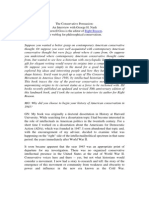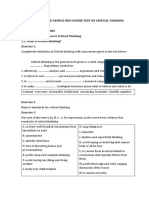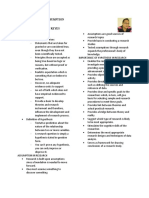Rationalism Unit Overview
Uploaded by
api-262774252Rationalism Unit Overview
Uploaded by
api-262774252American Literature with Mr.
Brennan: Unit 2
UNIT 2:
American Enlightenment and Rationalism: 1750 to 1800
U N I T O V E R V I E W
Primary Assessment: In a minimum of 750 words, analyze and evaluate the virtues and values that emerged during the American
Revolution as foundational to American identity.
Essential Questions for Class Discussion:
How are competing values (i.e., freedom/authority, spiritual/material, individual/community) reflected in colonial literature?
How did rationalist thought influence the early American experience? What did rationalists consider good for the community? What
are implications for individuals? What forces undermine rationalism? Is disobedience to authority just? If so, under what
circumstances? What forces are required to hold a nation or people together? What is required in becoming an ideal nation?
What was the significance of having a peoples believing that one can arrive at truth by using reason rather than relying on the
authority of the past, on religion, or on intuition have on American society?
How does the American Enlightenment mark a radical shift from the Puritan perception that man was irrational and basically corrupt,
to one in which man is rational and fundamentally good?
How do the writers of the American Enlightenment reflect the literary form and function of rationalism? How did rationalist thought
influence the early American experience?
How does the Deist concept of God contrast with the traditional Puritan view, and how did it influence American culture?
How does the "auto-American-biography" enable writers to construct themselves as ideal American citizens?
How does the works of Benjamin Franklin reflect the emergence of a new type of American hero?
What is an American? How did writers challenge and expand the definition of who should be considered an American?
What makes a good argument? How can the application of various rhetorical devices enhance a messages effectiveness?
Unit Literature
Year Author Text Genre Pages
2005 anonymous A Nation is Born Non-Fiction 3
1791 Benjamin Franklin The Autobiography Autobiography 5
1733-1758 Benjamin Franklin Poor Richard's Almanack Almanac 1
1758 Benjamin Franklin The Way to Wealth Self-Improvement 2.5
1733 Benjamin Franklin On Literary Style Literary Criticism 1.5
1776 Thomas Jefferson The Declaration of Independence Non-Fiction 1.5
1769 Thomas Jefferson Fugitive Slave Advertisement Advertisement 0.5
1776 Thomas Paine The Crisis, Number I Non-Fiction 1.5
1775 Patrick Henry Speech in the Virginia Convention Speech 1.5
1787 Benjamin Franklin Speech in the Convention Speech 1
1773 Phillis Wheatley Poems on Various Subjects Poetry 2
1800 Abigail Adams Letter to Her Daughter Letter 1
1782 Michel G. J. de Crvecoeur Letters from an American Farmer Non-Fiction 1.5
1782 Benjamin Franklin To Those Who Would Remove to America Non-Fiction 1
1784 Benjamin Franklin Remarks Concerning the Savages of N. America Non-Fiction 1.5
1789 Olaudah Equiano The Interesting Narrative . . . Slave Narrative 2
American Literature with Mr. Brennan: Unit 2
RATIONALISTIC BELIEFS
Natural Goodness: a human is born without taint or sin; the
concept of tabula rasa or blank slate.
Universal Benevolence: the attitude of kindness towards everyone.
Perfectibility: it is possible to improve ones situations of birth,
economy, society, and religion.
Utopianism: aiming for a state in which everything is perfect,
especially in laws, government, and social conditions
Rationalism: believing opinions and actions should be based on
reason and knowledge rather than on religious belief or
emotional response; also that reason rather than experience
is the foundation of certainty in knowledge
Flaws of Outdated Social Institutions: religious, social,
economic, and political institutions, which have not
modernized, force individuals into unacceptable behavior.
Deism: belief that God as an absentee landlord or a blind
watchmaker who created the universe, "wound it up" and
then disassociated himself from his creation. Most believe:
* God does not intervene in human affairs.
* one cannot access God through any organized religion.
* God has not selected a chosen people.
* the world operates by natural and self-sustaining laws.
* practical morality can be derived from reason without the
need to appeal to religious revelation and church dogma.
HISTORICAL CHARACTERISTICS, and
the Forces Undermining Puritanism
* ones natural desire to do good (works against predestination)
* dislike of a "closed" life
* presence of the leaders of dissent (A. Hutchinson, R. Williams)
* theocracy suffered from a lack of flexibility
* dev. of rational religion (use mind over Bible to know God)
* change in political conditions (Mass. became a Crown colony)
* dawn of liberalism: freedom from restraint
* resentment of the power of the few over many
* age of revolutions in America and in France (1789)
* scientific curiosity and experimentation
* change in economic conditions (growth of fishery, farms, etc.)
* economic concept of laissez-faire
* presence of the frontier (self-reliance, individualism, optimism)
* growth in nationalism
* growth in materialism
* age of the gifted amateur, and rise of the self-made man
* belief in progressivism
* cosmopolitanism of the new immigrants
LITERARY FORM and FUNCTION
During the Age of Reason, logic and discipline prevailed in the
writing of the time. Because attention of the nation was focused
on the events surrounding the Revolution, the literature was
mostly political. There was some personal writing such as poetry
and letters, but mostly writing was publicpamphlets, speeches,
and other documentsadvocating and supporting a break with
England. Public writers offered sound, clear arguments in
support of the causes. Personal writings, too, showed the
reasoning process.
KEY TERMS
Aphorism: a brief saying embodying a general truth
Lai s s e z- Fai re : French, meaning let [them] do, referring to an
economic environment free of governmental involvement
Logic: a way of thinking that is based on valid reasoning
(i.e., inductive, abductive, and deductive)
Materialism: a tendency to consider material possessions and
physical comfort as more important than spiritual values
Nationalism: an ideology that involves an individual identifying
with, or becoming attached to, one's nation; national pride
Progressivism: a broad political philosophy based on the idea
of progress, which asserts that advances in science,
technology, economic development, and social organization
can improve the human condition.
Tabul a Ras a: Latin, meaning blank slate, referring to the
human mind, esp. at birth, viewed as having no innate ideas
LITERARY TERMS
Allusion: a reference designed to call something to mind without
mentioning it explicitly
Connotation: an idea or feeling that a word invokes in addition to
its literal or primary meaning
Denotation: the literal or primary meaning of a word (i.e. definition)
Personification: attributing human qualities to something nonhuman
Objective: judgment not influenced by personal feelings or opinions
Rhetoric: language designed to have a persuasive effect
* Logos: rhetorical device, appealing to logic or reasoning
* Pathos: rhetorical device, appealing to passion or emotion
* Ethos: rhetorical device, reference speakers ethics or character
Rhetorical Device: technique designed to have a persuasive effect
* Concession: acknowledgement of opposing arguments
* Restatement: repeating an idea in a variety of ways
* Repetition: restating an idea using the same words
* Parallelism: repeating grammatical structure
* Rhetorical Question: questions with self-evident answers
Style: the ways that the author describes events, objects, and ideas
(e.g. use of word choice, sentence structure, figurative language,
sentence arrangement to establish mood, images, and meaning)
Subjective: judgment influenced by personal feelings or opinions
Tone: the general attitude of a piece of writing (e.g. sarcastic, hopeful)
You might also like
- Clint Fuhs - An Integral Map of Perspective-Taking-Appendix100% (1)Clint Fuhs - An Integral Map of Perspective-Taking-Appendix52 pages
- Maximal God - A New Defence of P - Yujin Nagasawa PDF100% (1)Maximal God - A New Defence of P - Yujin Nagasawa PDF242 pages
- THE REVOLUTIONARY PERIOD - ThomasPaine - TheAgeOfReasonNo ratings yetTHE REVOLUTIONARY PERIOD - ThomasPaine - TheAgeOfReason8 pages
- American Revolutionary Philosophy: Intro: Mercado TumminiaNo ratings yetAmerican Revolutionary Philosophy: Intro: Mercado Tumminia48 pages
- How the Conservatives Ruined America: Second Edition with an Appendix on TrumpismFrom EverandHow the Conservatives Ruined America: Second Edition with an Appendix on TrumpismNo ratings yet
- America Was Founded As An Anti-Christian Social OrderNo ratings yetAmerica Was Founded As An Anti-Christian Social Order20 pages
- Origins of Cultural Marxism 1 Article RevisedNo ratings yetOrigins of Cultural Marxism 1 Article Revised26 pages
- Redeeming America: Politics, Culture and The Intellectual in The USA100% (13)Redeeming America: Politics, Culture and The Intellectual in The USA219 pages
- Political Thought (The Teach Yourself Books) - C - L - Wayper - 1954-01-01 - English Universities Press, LTD - 0340056916 - Anna's ArchiveNo ratings yetPolitical Thought (The Teach Yourself Books) - C - L - Wayper - 1954-01-01 - English Universities Press, LTD - 0340056916 - Anna's Archive280 pages
- The Princeton Encyclopedia of American Political History Two volume set Michael Kazin (Editor) - Own the ebook now with all fully detailed content100% (1)The Princeton Encyclopedia of American Political History Two volume set Michael Kazin (Editor) - Own the ebook now with all fully detailed content58 pages
- Niemeyer Conservatism and New Political TheoryNo ratings yetNiemeyer Conservatism and New Political Theory8 pages
- Culture and Liberty in the Age of the American RevolutionFrom EverandCulture and Liberty in the Age of the American RevolutionNo ratings yet
- Unit 5 From The Colonial To The Federal: The Contexts of The American EnlightenmentNo ratings yetUnit 5 From The Colonial To The Federal: The Contexts of The American Enlightenment14 pages
- The Debate Over Slavery: Antislavery and Proslavery Liberalism in Antebellum AmericaFrom EverandThe Debate Over Slavery: Antislavery and Proslavery Liberalism in Antebellum AmericaNo ratings yet
- Instant Access to Studies in Political Science and Sociology Hu Shih ebook Full ChaptersNo ratings yetInstant Access to Studies in Political Science and Sociology Hu Shih ebook Full Chapters50 pages
- Liberalismo, Individualidad e IdentidadNo ratings yetLiberalismo, Individualidad e Identidad28 pages
- From Empiricism to Pragmatism: The American Philosophical RevolutionFrom EverandFrom Empiricism to Pragmatism: The American Philosophical RevolutionNo ratings yet
- Allan Bloom - ''Philosophy & The Founding'' (Las Vegas 1986)No ratings yetAllan Bloom - ''Philosophy & The Founding'' (Las Vegas 1986)20 pages
- Secret Destiny of America: Includes America's Assignment with DestinyFrom EverandSecret Destiny of America: Includes America's Assignment with DestinyNo ratings yet
- Bernard Bailyn, Gordon S. Wood, Andwhig Political Theory1100% (1)Bernard Bailyn, Gordon S. Wood, Andwhig Political Theory132 pages
- Studies in Political Science and Sociology Hu Shih 2024 Scribd Download100% (2)Studies in Political Science and Sociology Hu Shih 2024 Scribd Download65 pages
- Never a Matter of Indifference: Sustaining Virtue in a Free RepublicFrom EverandNever a Matter of Indifference: Sustaining Virtue in a Free RepublicNo ratings yet
- Guess Who's Coming to Dinner Now?: Multicultural Conservatism in AmericaFrom EverandGuess Who's Coming to Dinner Now?: Multicultural Conservatism in America5/5 (1)
- Gale Researcher Guide for: Literature of the Enlightenment and the American RevolutionFrom EverandGale Researcher Guide for: Literature of the Enlightenment and the American RevolutionNo ratings yet
- Studies in Political Science and Sociology Hu Shih - The ebook in PDF format with all chapters is ready for download100% (1)Studies in Political Science and Sociology Hu Shih - The ebook in PDF format with all chapters is ready for download70 pages
- Studies in Political Science and Sociology Hu Shih pdf download100% (1)Studies in Political Science and Sociology Hu Shih pdf download41 pages
- Big Tent: The Story of the Conservative Revolution—As Told by the Thinkers and Doers Who Made It HappenFrom EverandBig Tent: The Story of the Conservative Revolution—As Told by the Thinkers and Doers Who Made It HappenNo ratings yet
- Breaking White Supremacy: Martin Luther King Jr. and the Black Social GospelFrom EverandBreaking White Supremacy: Martin Luther King Jr. and the Black Social GospelNo ratings yet
- American Ism and Its Enemies by David GelernterNo ratings yetAmerican Ism and Its Enemies by David Gelernter9 pages
- The Paranoid Style in American Politics: An Essay: from The Paranoid Style in American PoliticsFrom EverandThe Paranoid Style in American Politics: An Essay: from The Paranoid Style in American PoliticsNo ratings yet
- Abrahamics and Liberation Unit MaterialsNo ratings yetAbrahamics and Liberation Unit Materials89 pages
- Becoming A Life Coach: Fundamental Life Coaching Tips and TechniquesNo ratings yetBecoming A Life Coach: Fundamental Life Coaching Tips and Techniques58 pages
- Methods of Philosophizing: The Phenomenological Method: Week 40% (1)Methods of Philosophizing: The Phenomenological Method: Week 417 pages
- Michel Henry From Communism To Capitalism Theory of A CatastropheNo ratings yetMichel Henry From Communism To Capitalism Theory of A Catastrophe138 pages
- Performativity: Lyotard and Foucault Through Searle and AustinNo ratings yetPerformativity: Lyotard and Foucault Through Searle and Austin10 pages
- Terms Used To Express Your Appreciation: Discussant: Professor: DR. EDWIN B. BUNAONo ratings yetTerms Used To Express Your Appreciation: Discussant: Professor: DR. EDWIN B. BUNAO7 pages
- Coded Inequality: Bank Probationary Officer Reasoning Ability100% (1)Coded Inequality: Bank Probationary Officer Reasoning Ability9 pages
- Statement of Proposition: CSCI 1900 Discrete StructuresNo ratings yetStatement of Proposition: CSCI 1900 Discrete Structures4 pages
- The Idea of Language Giorgio Agamben Caner C3a7etiner 12-11-20151No ratings yetThe Idea of Language Giorgio Agamben Caner C3a7etiner 12-11-2015128 pages
- Writing Assignments (x2) : Critical AnalysisNo ratings yetWriting Assignments (x2) : Critical Analysis4 pages
- Theoretical Foundations of Artificial General Intelligence100% (5)Theoretical Foundations of Artificial General Intelligence332 pages
- Methods of Proof Methods of Proof Direct Proof Disproof by Counter ExampleNo ratings yetMethods of Proof Methods of Proof Direct Proof Disproof by Counter Example14 pages
- (Two Vol. Set - The Pilgrimage of Reason - The Odyssey of Spirit) ) H. S. Harris-Hegel's Ladder. 1-Hackett Pub Co Inc (1997)50% (2)(Two Vol. Set - The Pilgrimage of Reason - The Odyssey of Spirit) ) H. S. Harris-Hegel's Ladder. 1-Hackett Pub Co Inc (1997)232 pages
- Zhou Et Al. - 2004 - Ontology Development For Unified Traditional Chinese Medical Language SystemNo ratings yetZhou Et Al. - 2004 - Ontology Development For Unified Traditional Chinese Medical Language System13 pages
- 02 - Saussure, 'Nature of The Linguistic Sign' and 'Immutability and Mutability of The Sign' From 'A Course in General Linguistics'100% (2)02 - Saussure, 'Nature of The Linguistic Sign' and 'Immutability and Mutability of The Sign' From 'A Course in General Linguistics'9 pages





















































































































